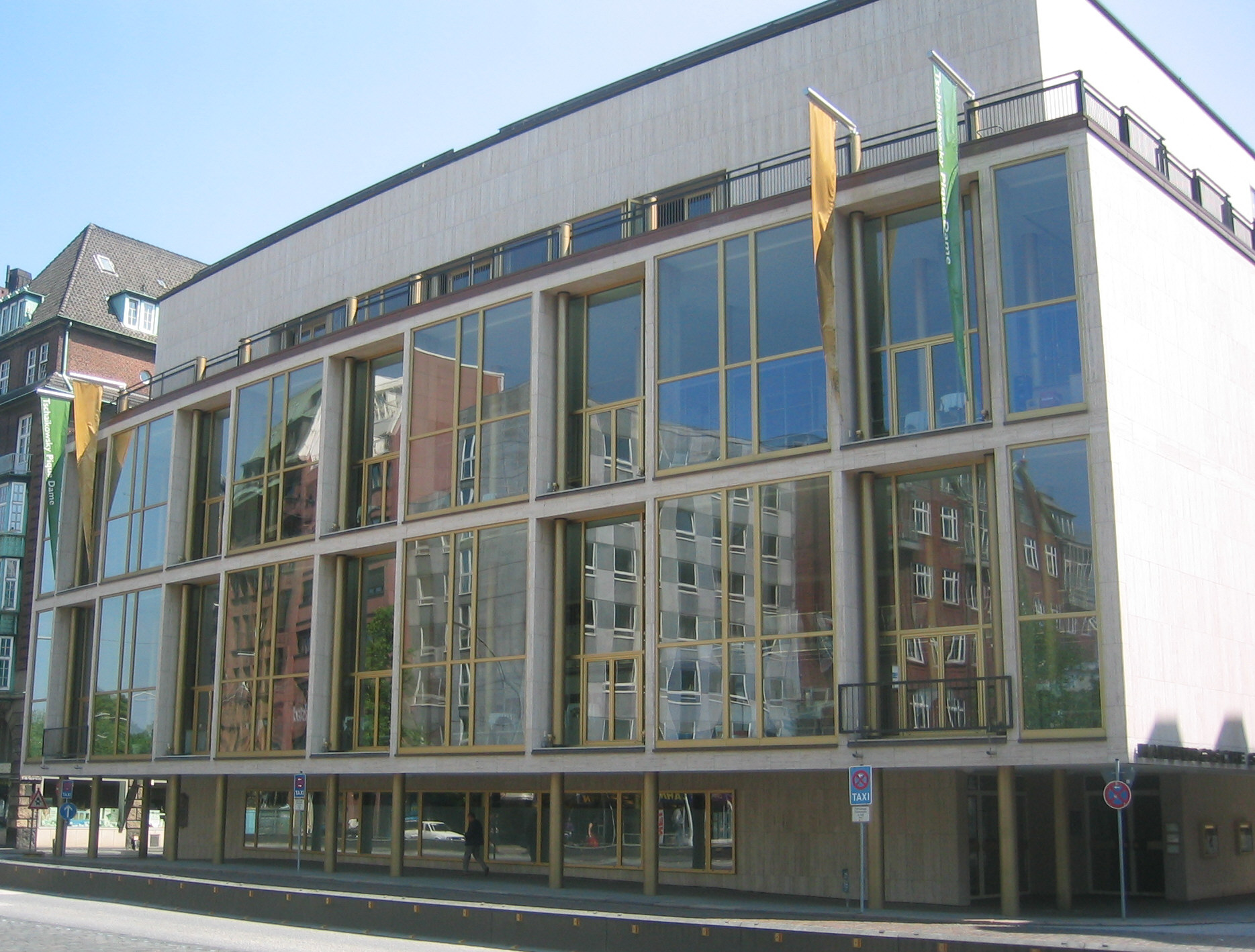- Hamburg State Opera
The Hamburg State Opera (in German: Hamburgische Staatsoper) is one of the leading
opera companies inGermany .Infobox Theatre
name = Hamburgische Staatsoper
image_size = 250px
caption = The present building of the Hamburg State Opera
address =
city =Hamburg
country =Germany
designation =
latitude =
longitude =
architect =
owner =
capacity =
type = Opera House
opened = 1678
yearsactive =
rebuilt = 1955
closed =
othernames =
production =
currentuse =
website = Opera in Hamburg dates back to2 January 1678 when the "Opern-Theatrum" was inaugurated with a performance of a biblical Singspiel by Johann Theile. It was not a court theatre but the first public opera house in Germany established by the art-loving citizens of Hamburg, a prosperous member of theHanseatic League .The Hamburg "Bürgeroper" resisted the dominance of the Italianate style and rapidly became the leading musical center of the German Baroque. In 1703,
George Friedrich Handel was engaged as violinist and harpsichordist and performances of his operas were not long in appearing. In 1705, Hamburg gave the world première of his opera "Nero".In 1721,
Georg Philipp Telemann , a central figure of the German Baroque, joined the Hamburg Opera, and in subsequent yearsChristoph Willibald Gluck ,Johann Adolph Hasse and various Italian companies were among the guests.To replace the aging wooden structure on the Gänsemarkt, the first stone was laid on
18 May 1826 for the "Stadt-Theater" on the present-day site of the Hamburg State Opera. The new theater, with seating for 2800, was inaugurated less than a year later with Beethoven's incidental music to "Egmont".The building was renovated in 1873, when both the exterior and interior remodeled in the reigning "Gründerzeit" style of the time, and again in 1891, when electric lighting was introduced.
Under the direction of Bernhard Pollini, the Stadtsoper mounted its first complete Ring Cycle in 1879. In 1883, the year of Wagner's death, a cycle comprising nine of his operas was commenced. The musical directors
Hans von Bülow (from 1887 to 1890) andGustav Mahler (from 1891 to 1897) also contributed to the fame of the opera house.In the beginning of the 20 century, opera was an important part of the theatre's repertoire; among the 321 performances during the 1907?08 season, 282 were performances of opera. The Stadt-Theater performed not only established repertoire but also new works, such as
Paul Hindemith 's "Sancta Susanna",Igor Stravinsky 's "The Soldier's Tale",Ernst Krenek 's "Johnny spielt auf ", andLeoš Janáček 's "Jenůfa".Ferruccio Busoni 's "Die Brautwahl" (1912) andErich Wolfgang Korngold 's "Die tote Stadt" (1920) both had their world premieres in Hamburg. In the 1930s, after Hitler came to power, the opera house was renamed "Hamburgische Staatsoper".On the night of
2 August 1943 , both the auditorium and its neighbouring buildings were destroyed during air raids by fire-bombing; a low-flying airplane dropped several petrol and phosphorus containers on to the middle of the roof of the auditorium, turning it into a conflagration.The current Statsoper was opened on
15 October 1955 with Mozart's "Die Zauberflöte ". Hamburg continued to devote itself to new works, such asHans Werner Henze 's "The Prince of Homburg" (1960), Stravinsky's "The Flood" (1963), andMauricio Kagel 's "Staatstheater" (1971).More recently, Hamburg gave the world premières of
Wolfgang Rihm 's "The Conquest of Mexico" (1992) andHelmut Lachenmann 's "The Little Match Girl" (1997), for which it received much international acclaim.Since 2005, the Australian conductor
Simone Young has been general director of the Hamburg State Opera.External links
* [http://www.hamburgische-staatsoper.de/0_english/2_state_opera/frameset_state_opera.php Hamburg State Opera website]
Wikimedia Foundation. 2010.
